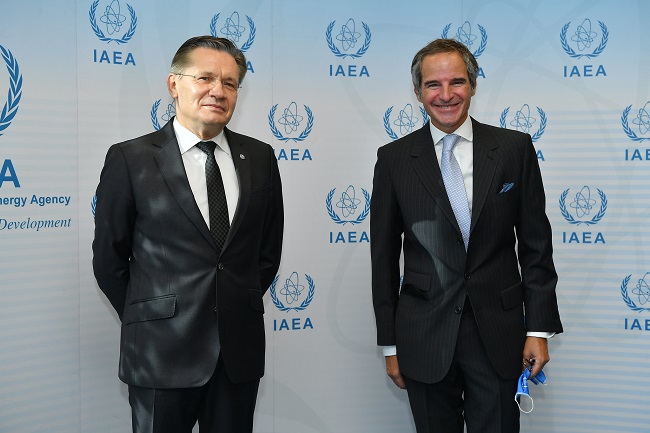
The Russian delegation was headed by Alexey Likhachev, Director General of ROSATOM. During the plenary session, he noted the IAEA’s contribution to the fight against the coronavirus pandemic. “The Agency, relying on its unique experience, promptly organized the supply of modern equipment for the diagnosis of coronavirus to the countries in need. Russia did not stand aside and supported the Agency’s initiatives.”
Within the framework of the General Conference business agenda, the Russian side organized a number of online events with international experts in the field of nuclear energy taking part in them along with ROSATOM representatives.
One of them was the webinar “Nuclear Science and Technology for a Better Life”, during which the participants exchanged views on the prospects for cooperation in order to achieve a new level of scientific and technical knowledge, improve living standards and implement large-scale research programs. Special attention was paid to the importance of research in the field of nuclear technologies application for the development of agriculture, medicine and other socially important areas. The participants also discussed approach to effectively integrate nuclear science and technology into strategies for the development of the economy, industry, science and education of countries to achieve the UN sustainable development goals.

Another important event was the discussion on “Nuclear Power: Valuable Domestic Energy Source and Assurance of Energy Supply Stability in Times of Economic Strain”, in which experts examined the benefits of the atom in the context of global climate and environmental challenges, energy market volatility and the economic crisis. “We accept the request of the climate agenda, but we need to remember that renewables or any other source of electricity alone could not guarantee power grid security. In this way we suggest to examine the so-called “green square” concept, which is based on four low-carbon power sources: wind, water, sun and atom. Working in tandem, they provide a foundation for a sustainable energy mix. Nuclear energy has its proper place in this scenario, providing reliable baseload electricity supply that is independent of weather conditions,” said Polina Lion, Chief Sustainability Officer, ROSATOM.
Finally, a special event was the discussion on “Gender balance and inclusiveness in the nuclear industry as a key to achieving sustainable development goals”, which brought together women leaders of international organizations and industry. The discussion focused on the main trends in the global nuclear industry for the development of gender balance and inclusiveness, which can be applied in other industries. Tatiana Terentyeva, HR Director of ROSATOM, presented the Russian experience in her report: “We believe that a sustainable future of the nuclear industry is impossible without highly qualified employees. The agenda is realized by proactively addressing diversity issues and unlocking the hidden potential of every person, no matter where he or she lives and works. This is especially true for women: thanks to our ecosystem of talent support, women hold about a third of leadership positions in our corporation.”
Also, on the sidelines of the Conference, Alexey Likhachev met with IAEA Director General Rafael Grossi, OECD NEA Director General William Magwood and Minister of Territorial Administration and Infrastructure of the Republic of Armenia Suren Papikyan. Alexey Likhachev, ROSATOM Director General and Ibrahim Othman, Director General of the Atomic Energy Commission of Syria signed a Memorandum of Understanding on cooperation in the field of non-energy applications of nuclear technologies for peaceful purposes.
In addition, Rosatom Technical Academy and IAEA remotely signed a Memorandum of Cooperation that expands previous agreements on non-energy applications of nuclear and radiation technologies.
For reference:
The International Atomic Energy Agency (IAEA) is an organization within the United Nations family. It is the international centre for cooperation in the nuclear field. The Agency collects scientific and technical information, promotes its exchange, elaborates the standards of nuclear and radiation safety, using the existing staff of international inspectors for the regular check on the peaceful nuclear activities of different states (over 900 sites around the world). Russia, as one of the IAEA founding countries and one of the world nuclear industry leaders plays a significant role in the activities of the organization and enjoys considerable authority among its member states. The IAEA governing bodies are the General Conference and the Board of Governors. Sessions of the General Conference attended by delegates of all Member States are held annually in September to review and approve the annual report to be submitted to the UN and the Agency’s budget, elect and appoint members of the Board of Governors and discuss any other issues related to the organization’s activities.
Photo: Press Office of IAEA